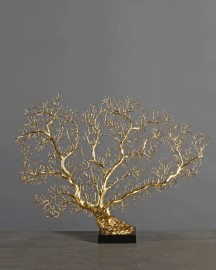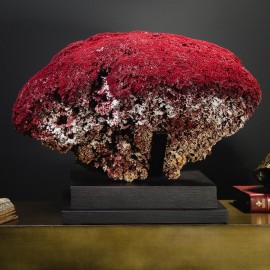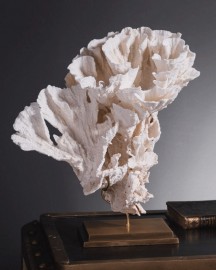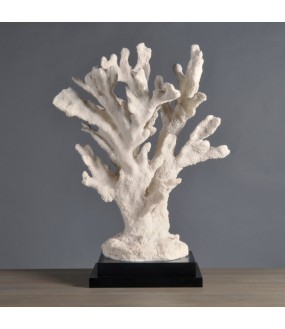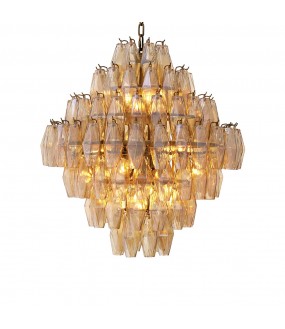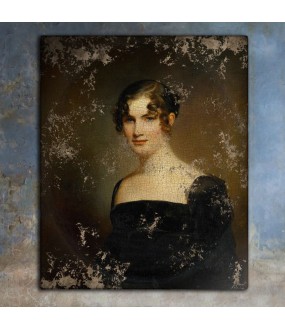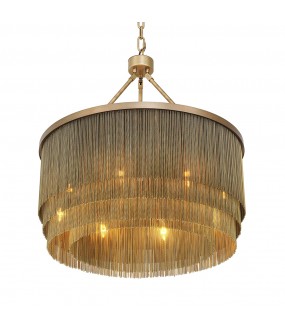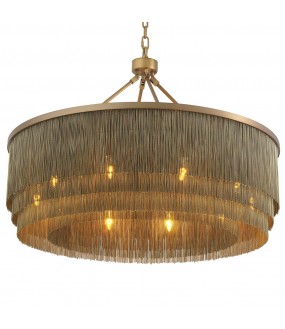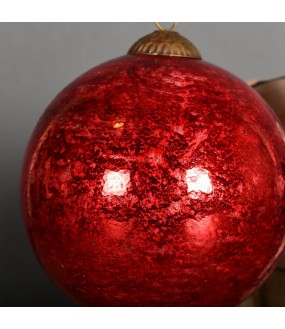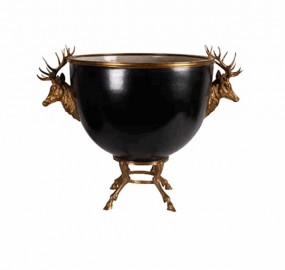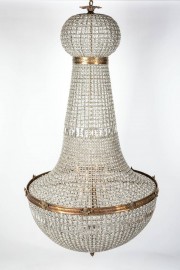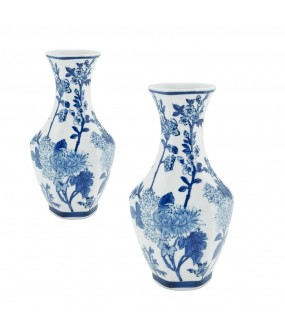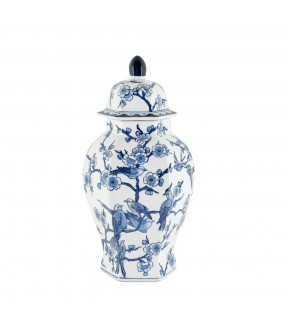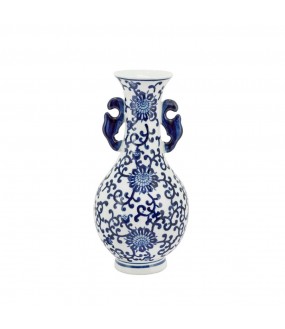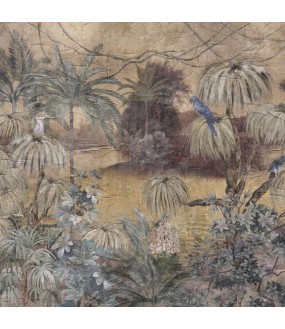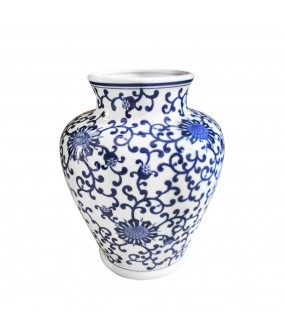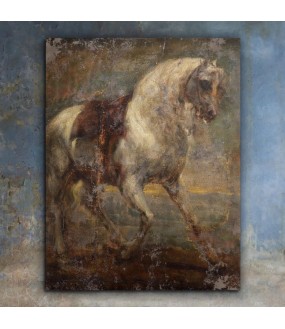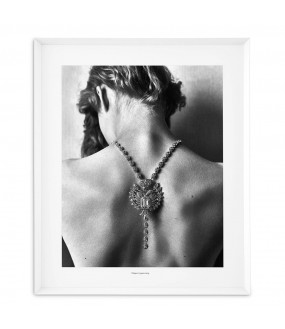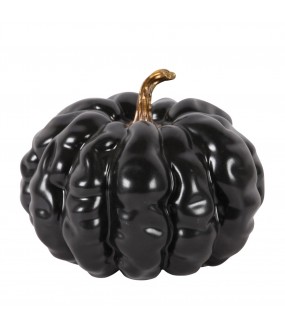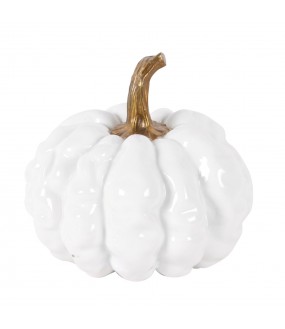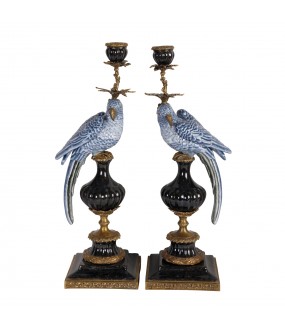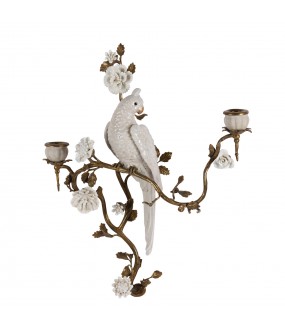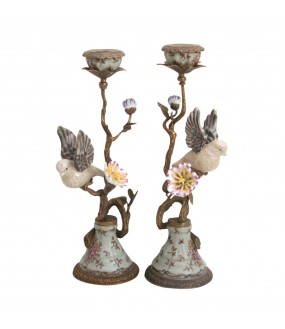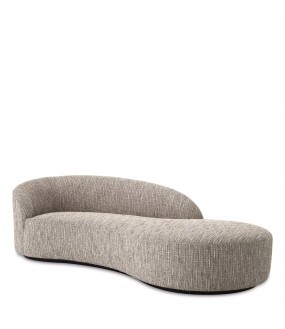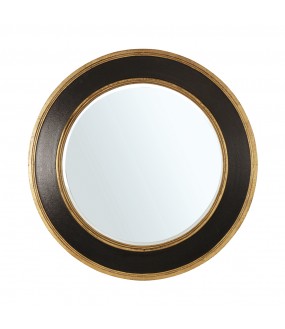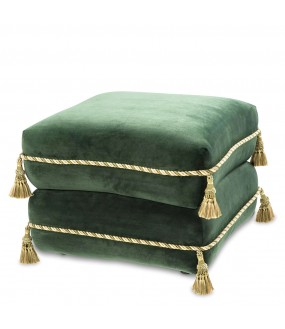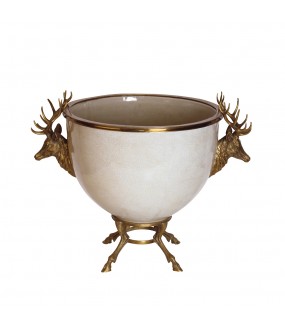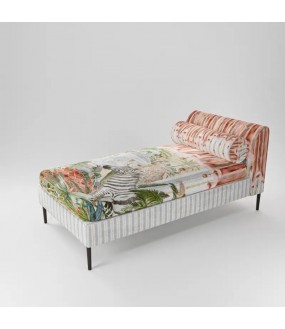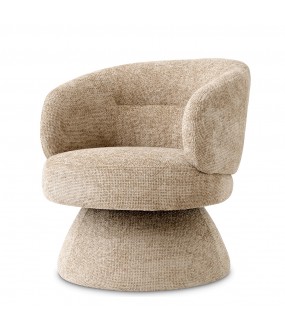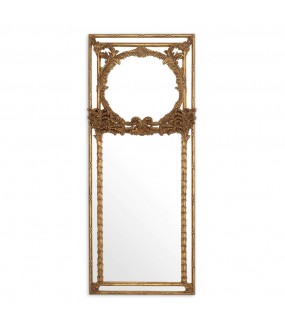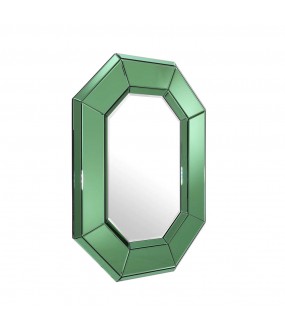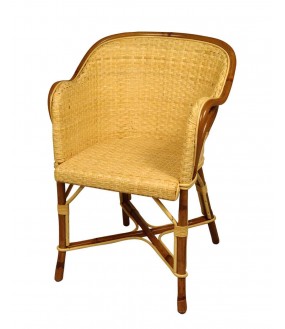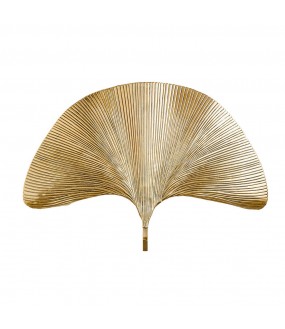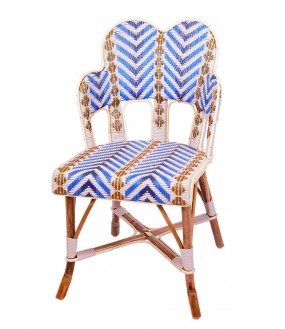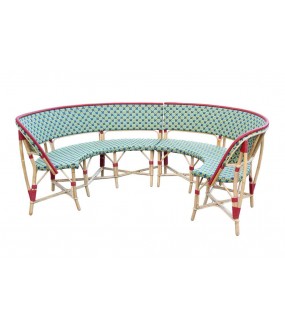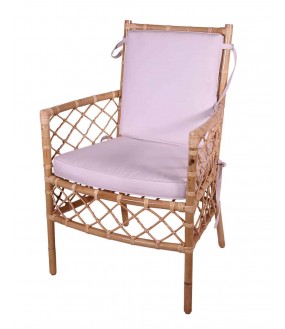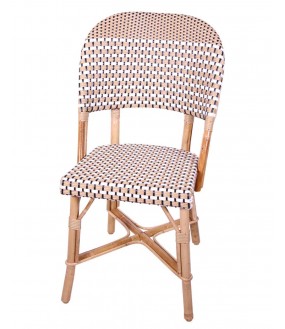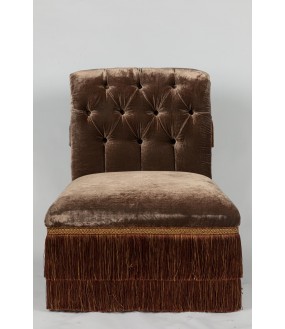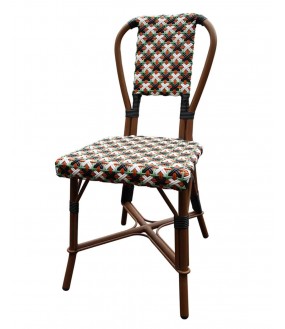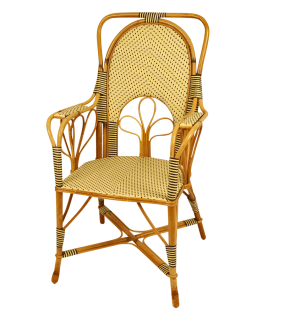Wedding Day
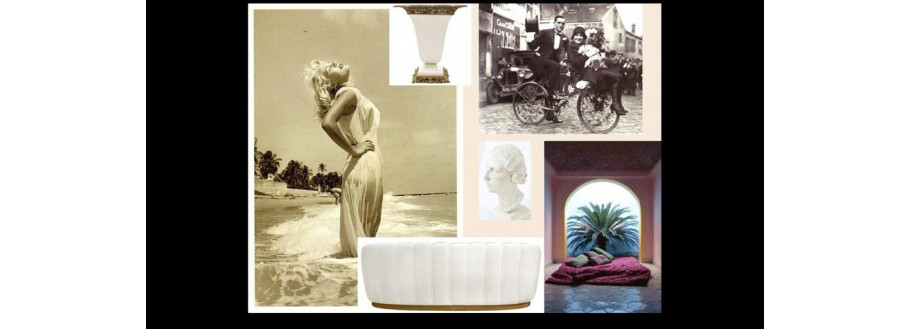
Eternal and romantic places, beautiful family mansions, exquisite manor-houses, French glamorous vintage and retro atmospheres for happy days.
Arteslonga, French Home Decoration and Lifestyle House
To find more, please click here.
-
Gorgonian Reproduction Golden Version
€230.00Gorgonians, sometimes called horn corals or bark corals, number around 1,200 species that are found in all tropical and subtropical seas. Here a very beautiful reproduction in synthetic material in a golden version. Fan-shaped, often brightly colored (red, yellow, purple), their skeleton is made up of a soft and hard substance, gorgonin.
-
Red coral on black base, Unique !
€3,680.00Red coral on black base. One of a kind ! This great red color is natural. But under the sea you would not notice it, as it look like a field of white flowers: the polyps (small animals) living in each pipe of this incredible "coral-city ". Only the skeleton reveals such a great color.
-
Montipora Coral, CITES certified
€924.00This Montipora coral has a shape typical of its species: it looks like a flower. This coral has grown sheltered from strong waves, and underwater, only the border of these delicate petals is bright pink. This Pacific coral is accompanied by its CITES certificate, since it is, of course, perfectly legal.
-
Giant Branch Coral White Resin H66cm
€840.00Reproduction of a giant branch coral from the lagoons of Oceania.
Coral is actually an animal of the Cnidarian phylum.
Corals generally live in colonies of individuals called “polyps” which are “superorganisms”.
Each polyp secretes its own exoskeleton; depending on the species, this exoskeleton is hard or soft.
Our collection of corals in synthetic material is handcrafted, reproducing identically the texture of these living specimens, most of which are now protected.
-
Amber Glass Nikki Chandelier H74cm
€4,140.00The Nikki chandelier has a charm and bewitching beauty thanks to its extraordinary design and the materials used.
This beautiful antique brass finish chandelier features diamond shaped amber glass tubes that let light through, creating a radiant glow that is mesmerizing.
This chandelier is entirely shaped by hand with a diameter at the widest of 65cm.
Materials: metal and amber glass.
Dimmable: Yes
Hanging system: 150cm chain
Light source: 17 bulbs (not included) - E14 - 40 Watt max - 220-240 Volt.
-
Painting H145x113cm, Young Woman Portrait
€1,440.00Cracked Canvas H145x113cm, Portrait of a Young Woman.
A canvas straight out of the corridors of time.
Every accident and lack, every crack or patina effect is never the result of chance... everything is brought together here so that this reinterpretation becomes more real than life: rusty nails, stamp, traces of humidity and old chassis... .everything is brought together here so that this reinterpretation becomes more real than life.
Allow a minimum production time of 4 weeks
-
Brass Chandelier Sacha ø60cm
€3,192.00The Sacha chandelier has a charm and bewitching beauty thanks to its extraordinary design and the materials used.
Featuring an antique brass finish, the Sacha Large Chandelier brings glitz to your space with its eye-catching design.
With four rows of thin chains reminiscent of 1920s fringed dresses, Sacha chandelier exudes The Great Gatsby glamor and extravagance. Do not hesitate to combine with one or more small Sacha chandeliers for more effect.
This beautiful antique brass finish chandelier lets in light that is mesmerizing.
This chandelier is entirely shaped by hand with a diameter of 60cm.
Dimmable: Yes
Hanging system: 150cm chain
Lamp socket: E14
Lamp holder quantity: 8
Maximum power: 40 watts
Maximum voltage: 220 - 240 Volt
Hanging system: 150cm chain
-
Sacha Brass Chandelier ø90cm
€4,200.00The Sacha chandelier has a charm and bewitching beauty thanks to its extraordinary design and the materials used.
Featuring an antique brass finish, the Sacha Large Chandelier brings glitz to your space with its eye-catching design.
With four rows of thin chains reminiscent of 1920s fringed dresses, Sacha chandelier exudes The Great Gatsby glamor and extravagance. Do not hesitate to combine with one or more small Sacha chandeliers for more effect.
This beautiful antique brass finish chandelier lets in light that is mesmerizing.
This chandelier is entirely shaped by hand with a diameter of 90cm.
Dimmable: Yes
Hanging system: 150cm chain
Lamp socket: E14
Lamp holder quantity: 10
Maximum power: 40 watts
Maximum voltage: 220 - 240 Volt
Hanging system: 150cm chain
-
Christmas Balls in Antique Red Cracked Glass...
€29.00Exceptional arrival of a batch of Christmas balls in antique red cracked glass ø15cm, as they were made in the 19th century.
Until 1850, tradition was to decorate your tree with wreaths, dried fruit, especially apples. In 1858 a drought deprived the Vosges of their annual harvest. This is how a glassblower had the idea of blowing his first glass balls, colored red to remind us of apples. Very quickly, the tradition took hold.
Returning to the tradition of the glassblower, these superb balls with exceptional dimensions take on an oxidation-effect patina which gives them a sumptuous and magical allure, like jewels hanging on the tree ...
A "must-have" to enchant our end of the year !
Available in several sizes and colors:
> Red: Ø 15
> Antique Green: Ø 15
> Antique Blue: Ø 15/20
> Gold: Ø 15/20/25
> Silver: Ø 15/20/25
* books and bases sold separately
-
Porcelain Bowl with Stag Heads
€1,859.00Large and beautiful bowl or planters made in porcelain and brass.
Can be used as a magnificent Champagne cooler!
Stag heads and feet in worked brass.
To put on a large farm table or a console.
Hihgly qualitative item made by hand.
-
Chandelier Balloon Crystal H190cm
€4,560.00Very Large Chandelier Balloon Crystal 190cm high and 100cm wide. Brilliant as diamonds, glass pendants are carefully carved to reflect the light to infinity. E14 / 40watt bulbs, metal structure. A unique piece of Empire style. Chain of the size of your choice.
-
Pair of Chinese Porcelaine Vases H26cm
€120.00Two superb Chinoiserie vases in white porcelain with blue oriental floral motifs.
Completely hand painted.
A limited edition.
Vase height: 26 cm
-
Chinese Porcelain Jar H35cm
€120.00Superb Chinese porcelain jar with blue patterns. Completely hand painted. Chinese artisanal manufacture. A limited edition. Height of this jar: 54 cm
-
Chinese Porcelain Vase with Handles H36cm
€120.00Chinoiserie vase in white ceramic with double handles with blue oriental floral motifs.
Completely hand painted.
Homemade.
A limited edition.
Vase height: 36 cm
-
Fresco Wall Edonia, Made to Measure
The Edonia fresco wall, made to measure.
A scene of the canopy bathed in light and filled with wonders.
It is a unique wall decoration element. This fresco is a real painting, a permanent journey full of surprises in which this fresco takes us.
This fresco is only suitable for interiors (walls), resistant to shocks and easy to maintain.
Quote on request, specify the height and width to be covered. A Good to print for validation will be submitted to you before going into production.
 Impact resistant
Impact resistant Washable
Washable Embossed surface
Embossed surface Application with glue
Application with glue Removable
Removable -
Chinese Porcelain Vase H28cm
€180.00Chinoiserie vase in enamelled porcelain with blue patterns.
Completely hand painted.
A limited edition made by hand.
Vase height: 28 cm
-
Painting Moving Horse H116x89cm
€980.01A large and beautiful painting straight out of the corridors of time. A reinterpretation of Anthony van Dyck's work.
The original canvas was reproduced in the paint shop and then meticulously aged entirely by hand.
Every accident and lack, every crack or patina effect is never the result of chance... everything is brought together here so that this reinterpretation becomes more real than life.
Dimensions: H116 x 89 x 2cm
-
Naked Neck Photograph H124cm
€2,450.01A superb photo taken by the award-winning Dutch photographer Philippe Vogelenzang which we offer as fine art prints to our customers.
Vogelenzang, who has photographed for publications such as Vogue, Beauty Papers, V Magazine and L'Officiel, is known for his vision of sophisticated beauty and glamor that aligns perfectly with our House aesthetic.
White wood frame and glass.
Dimensions: 104 x 124 x D. 6 cm
-
Black Pumpkin, Porcelain
€230.01Decorative object made in white porcelain shaped as a round pumpkin.
Brass handle.
-
Pumpkin, White Porcelain
€192.00 -
Blue Parrot Candlesticks, The Pair
€1,200.00High porcelain candlesticks 50cm high. This candlestick is made of black porcelain with a beautiful blue porcelain parrot. The base of the candlestick is square and column is made of black porcelain and brass that are worked and sculpted in the Napoleon III style. Admirable item in a baroque, romantic and naturalistic style that we love.
-
Parrot Sconce, Right
€780.00Large wall sconce with its parrot white porcelain and brass.
Wall sconce made of porcelain and worked brass rods.
Height 48cm, width 31 cm and depth 12 cm.
The wall hanging is at the rear of the parakeet and therefore invisible to the eye.
-
Candlesticks, Porcelain Flying Birds
€680.00A pair of candlesticks with Nightingale in porcelain that fly their branch made in brass. The foot of the candlesticks is made of porcelain, light blue and purple colors, carved brass base. Beautiful brass rods twisted and worked and porcelain flowers ending with porcelain candlesticks. Two porcelain candlesticks of extreme delicacy.
-
Sofa Beige Venus L248 cm
€3,640.00Organically shaped, upholstered in beige woven cotton fabric and finished with a black base, the Venus sofa will complement a myriad of interior styles and colors, from minimalist to maximalist and bohemian to eclectic.
It's the perfect sofa to stretch out and relax on.
A marvel for this sofa with a curved design that will definitely embellish the interior decoration of your house or apartment.
The Venus sofa, all in voluptuousness and with its remarkable comfort, will easily find its place of choice to perfect your interior decoration.
Dimensions of the Venus sofa:
Length: 248cm
Width: 104cm
Height: 74cm
Seat depth: 62 cm
Seat height: 42 cm
Remarkable Beige woven cotton fabric and an impeccable finish on the seams for this timeless and high-end decorative piece of furniture.
A seat of exceptional comfort and perfect support thanks to a density of the seat and backrest of 30kg per m3.
Delivery by carrier by appointment.
-
Hermione Beveled Mirror ø95cm
€1,320.00A large antique gilt round beveled mirror.
Its frame, which follows the contour of the mirror, is designed in black wood and old-fashioned aged gold edging.
The back of the mirror is made of plywood for perfect support and grip.
A large size with a diameter of 95cm.
A beautiful one-of-a-kind decorative mirror.
Delivery by carrier. The greatest care is taken in its packaging and protection for your delivery.
-
Green Velvet Ottoman Scala
€520.01An ottoman made with two stacked cushions in dark green velvet upholstery, the Scala Ottoman has a unique appearance. It's not just an occasional seat, but a sophisticated looking dressy accessory that will warm up your living room or bedroom.
Featuring a gold and green cord with tassels, this ottoman is reminiscent of decadent boudoir furniture...
A beautiful contemporary manufacture with an irreproachable finish.
A beautiful piece of furniture for a charming interior decoration, very comfortable.
-
Large Champagne Porcelain Bowl with Deer Heads...
€1,859.00Large and beautiful bowl made in white porcelain and brass with deer heads.
Can be used as a magnificent Champagne cooler!
Stag heads and feet in worked brass.
To put on a large farm table or a console.
Hihgly qualitative item made by hand.
-
Chaise Longue The Traveller, Made To Order
€3,900.00This chaise longue du Voyageur is a true traveler's dream! This daybed is a truly unique and beautiful piece of furniture. It is covered with a beautiful printed fabric that represents tropical plants and animals:: palms and traveler's trees, giant ferns and a zebra!
The Chaise Longue is upholstered in a gorgeous fabric that is both comfortable and beautiful. The design is lovely and the colors are vibrant.
If you just wanted to have a beautiful and comfortable place to rest, this daybed is a must!
The canopy is not far away with its sounds of insects, butterflies and colorful birds...
The Traveller's tree, also called ravenale or ravinala in Malagasy, are tropical plants native to Madagascar and endemic, that is to say they only grow there. They were nevertheless introduced by settlers in the 19th century in various botanical gardens around the world, such as Singapore and Malaysia.
Its sap is abundant and drinkable and earned it its name Traveller's Tree because anyone can quench their thirst easily with the blow of a machete.
Discovered by botanist Philibert Commersson in 1780, it is easily recognizable thanks to its large fan-shaped leaves that make it look like a palm tree.
The bulletin of the National Society of Acclimatization of France: review of applied natural sciences 1896 (Gallica, BNF) declares about it: "The water contained in the heart of the tree allows the traveler to be quenched. By piercing the heart of the tree, fresh water springs from it which is particularly thirst-quenching."
Dimensions of the chaise longue: L 164 cm x W 84 cm x H 80 cm
-
Swivel Armchair Galatée
€1,010.00The Galatea swivel armchair, covered with a sand-coloured fabric, will stand out with its unexpected shape, a throwback to the 70s.
This 70s-inspired swivel armchair with its curved backrest has a swivel reverse conical base.
The Galatée armchair is a unique and essential piece of furniture for a chic and very comfortable atmosphere.
A decorative item to place in a living room, hotel lobby or lounge area or office to create a warm and cozy atmosphere.
Haute couture furniture, a remarkable piece.
High-end contemporary manufacturing in the chosen materials and an irreproachable finish.
An exceptional seat:
Seat density: 30kg/m3
Seat back density: 30kg/m3
-
Récamier Mirror H230cm, 2 finishes available
€4,400.00Sculpté à la main dans du bois d'acajou et orné de feuilles et de fleurs délicates, le cadre à la finition dorée ou blanc vieilli de style français est absolument magnifique.
Très haut miroir de réalisation artisanale actuelle de style ancien et baroque du plus bel effet.
De très belles finitions.
Une pièce originale et de belle qualité.
-
Art Deco Mirror Lady, H106cm
€1,500.00Create an aesthetic Art Deco touch in your living space with the Lady green octagonal mirror.
With its original silhouette and its bevelled mirrored glass segments, this very beautiful wall mirror in the Art Deco style will certainly embellish your interior with discreet luxury.
Inspired by the elegant contours of the Art Deco design era, its frame is green beveled mirrored glass drawn in an unusual octagonal shape.
A nice size of 1O5cm in height.
A beautiful one-of-a-kind decorative mirror.
Delivery by carrier. The greatest care is taken in its packaging and protection for your delivery.
-
Large Rattan Armchair Vintage Style 1900's
€800.00Imposing armchair in vintage style but light, entirely woven with natural lamina, it can be woven "to measure" in synthetic fibre.
Available from stock, price on request.
This natural fiber armchair.
This large rattan armchair will embellish your kitchen, your living room, your terrace, your veranda or your restaurant.
Overall height: 80cm
Overall width: 64cm
Overall depth: 62cm
Weight: 7kg
Seat height: 45cm
Seat width: 43 cm wide seat
Indoor/Outdoor: Indoor (this furniture must absolutely remain dry.)
Colors: Cannage Natural blade
Stackability: Not stackable
Material: Light Rattan (Manila)
Fiber: Natural Blade
Finish: Glossy varnish
Possibility of weaving the Cruise line armchair in your colors, a made-to-measure production with the color of caning and the weaving of your choice (see photos).
Rattan, a material with extraordinary properties with limits. Rattan is a vine of the Palm race, which grows in very humid or even swampy equatorial forests.
With its siliceous skin like glass, this extremely solid and light vine is particularly resistant to humidity, as are tropical woods, teak or others.
But this resistance has its limits. Exposed to rain, rattan resists very well for a whole day or even a few days. But if this rain continues for too many hours, the humidity will gradually penetrate the Rattan, and day after day the material kept damp will end up slowly degrading and losing its resistance qualities.
The physical limits of rattan imply precautions for use. On the terraces of Parisian cafes, the chairs can last for decades while they are often in the rain all day for long periods. But they are piled up every night under cover and can thus dry out.
More generally, rattan can withstand rain for long hours without compromising its longevity, but must be able to dry regularly.
In practice, rattan furniture can stay outside throughout the "summer season", the weather is hot and rather dry, continuous rains exceptionally last more than three or four days and Rattan withstands such rains without degrading.
But as soon as the season advances, the temperature drops, there is a lot of condensation and humidity, the Rattan will gradually become humid, the long and heavy rains accentuating this degradation. In practice, these are sensitive situations by the sea.
It is then imperative to put the seats under shelter, a ventilated shelter to avoid progressive humidification as soon as the "bad season" arrives, in practice from mid-October to mid-March for a continental climate.
The alternative if you want to use your Rattan furniture all year round, is to put it away daily, every evening, as Parisian terraces do.
In summary, 2 main principles to respect:
During the winter season (October 15 to March 15 in Europe) in all climates: the furniture must be stored “dry”. It can however be left outside during the day, but must imperatively be put in the dry during the night.
During the "beautiful season", the rest of the time, the Rattan can remain permanently outside.
However, if a lasting rain arrives, the Rattan should only be left in this rain for two or three days at the most, before drying the furniture to
so that it can dry out. He only takes it out once the rain has stopped (In any case, a terrace cannot be used in the rain).
-
Ginkgo Wall Lamp H48x67cm
€1,032.00The Ginkgo wall lamp.
A beautiful wall lamp in the style of the 20s-30s with its beautiful Ginkgo-shaped leaves made of polished brass.
Its design makes this luminaire a decorative centerpiece and perfect for an environment with an exotic or Art Deco design. The Ginkgo wall lamp can be used elegantly in any room of your living space to make it a chic and elegant place.
If you love the botanical jungle trend, the Ginkgo wall lamp is a must have for you!
With its glamorous polished brass finish, elegant curves and intricate detailing, this arboreal beauty will lend tropical opulence to your home.
Bulb type: E14
Number of bulbs: 1
Voltage: 220 - 240 Volts
Power: 40 watts
-
Magnificent Rattan Chair, Made on Order
€1,398.00Superb handcrafted rattan chair, made on demand.
This cane chair is ideal for your terrace, in your garden but also for your interior.
Very comfortable, this exceptional rattan chair is light and very resistant.
This chair will beautify your living room, your kitchen, your terrace, your veranda or your restaurant.
A magnificent French craftsmanship, this chair is entirely handmade.
Type: chair with wide seat 43cm
Stackability: Not stackable
Indoor/Outdoor: Indoor, Outdoor friendly
Fiber: Satin (Raucord)
Structure materials: Dark rattan (Malacca)
Weaving range: exceptions
Colours: Satin Beige – Pantone 7502, Satin Ultramarine Blue – Pantone 534, Satin Royal Blue, Satin Terracotta, Satin Olive Green – Pantone 5743
Seat height: 45cm
Seat width: Wide seat
Overall height: 81cm
Overall width: 58cm
Overall depth: 63cm
Weight: 7kg
Varnish and paint: Varnish
Rattan, a material with extraordinary properties with limits.
Rattan is a vine of the Palm race, which grows in very humid or even swampy equatorial forests.
With its siliceous skin like glass, this extremely solid and light vine is particularly resistant to humidity, as are tropical woods, teak or others.
But this resistance has its limits. Exposed to rain, rattan resists very well for a whole day or even a few days. But if this rain continues for too many hours, the humidity will gradually penetrate the Rattan, and day after day the material kept damp will end up slowly degrading and losing its resistance qualities.
The physical limits of rattan imply precautions for use. On the terraces of Parisian cafes, the chairs can last for decades while they are often in the rain all day for long periods. But they are piled up every night under cover and can thus dry out.
More generally, rattan can withstand rain for long hours without compromising its longevity, but must be able to dry regularly.
In practice, rattan furniture can stay outside throughout the "summer season", the weather is hot and rather dry, continuous rains exceptionally last more than three or four days and Rattan withstands such rains without degrading.
But as soon as the season advances, the temperature drops, there is a lot of condensation and humidity, the Rattan will gradually become humid, the long and heavy rains accentuating this degradation. In practice, these are sensitive situations by the sea.
It is then imperative to put the seats under shelter, a ventilated shelter to avoid progressive humidification as soon as the "bad season" arrives, in practice from mid-October to mid-March for a continental climate.
The alternative if you want to use your Rattan furniture all year round, is to put it away daily, every evening, as Parisian terraces do.
In summary, 2 main principles to respect:
During the winter season (October 15 to March 15 in Europe) in all climates: the furniture must be stored “dry”. It can however be left outside during the day, but must imperatively be put in the dry during the night.
During the "beautiful season", the rest of the time, the Rattan can remain permanently outside.
However, if a lasting rain arrives, the Rattan should only be left in this rain for two or three days at the most, before putting the furniture in the dry place so that it can dry. He only takes it out once the rain has stopped (In any case, a terrace cannot be used in the rain).
-
Superb Rattan Half Moon Bench, Made to Order
Superb bench in the shape of a half moon in woven rattan is made exclusively to measure. This magnificent bench will contribute to the general atmosphere of your interior or exterior ambiance.
Handcrafted rattan bench, made to order.
Price upon request.
This marvelous cane bench is ideal for your terrace, in your garden but also for your interior.
Very comfortable, this bench is light and very resistant.
A magnificent French craftsmanship, the Guinguette bench is entirely handmade.
Custom seat.
Stackability: not stackable
Indoor/Outdoor: Semi-outdoor
Fiber: Brilliant (Rilsan)
Colours: Gloss Bordeaux, Gloss Yellow, Gloss Putty
Structure materials: Light rattan (Manila)
Weaving range: prestige
Seat height: 45cm
Overall height: custom
Overall width: custom
Overall depth: custom
Varnish and paint: Varnish
Rattan, a material with extraordinary properties with limits.
Rattan is a vine of the Palm race, which grows in very humid or even swampy equatorial forests.
With its siliceous skin like glass, this extremely solid and light vine is particularly resistant to humidity, as are tropical woods, teak or others.
But this resistance has its limits. Exposed to rain, rattan resists very well for a whole day or even a few days. But if this rain continues for too many hours, the humidity will gradually penetrate the Rattan, and day after day the material kept damp will end up slowly degrading and losing its resistance qualities.
The physical limits of rattan imply precautions for use. On the terraces of Parisian cafes, the chairs can last for decades while they are often in the rain all day for long periods. But they are piled up every night under cover and can thus dry out.
More generally, rattan can withstand rain for long hours without compromising its longevity, but must be able to dry regularly.
In practice, rattan furniture can stay outside throughout the "summer season", the weather is hot and rather dry, continuous rains exceptionally last more than three or four days and Rattan withstands such rains without degrading.
But as soon as the season advances, the temperature drops, there is a lot of condensation and humidity, the Rattan will gradually become humid, the long and heavy rains accentuating this degradation. In practice, these are sensitive situations by the sea.
It is then imperative to put the seats under shelter, a ventilated shelter to avoid progressive humidification as soon as the "bad season" arrives, in practice from mid-October to mid-March for a continental climate.
The alternative if you want to use your Rattan furniture all year round, is to put it away daily, every evening, as Parisian terraces do.
In summary, 2 main principles to respect:
During the winter season (October 15 to March 15 in Europe) in all climates: the furniture must be stored “dry”. It can however be left outside during the day, but must imperatively be put in the dry during the night.
During the "beautiful season", the rest of the time, the Rattan can remain permanently outside.
However, if a lasting rain arrives, the Rattan should only be left in this rain for two or three days at the most, before putting the furniture in the dry place so that it can dry. He only takes it out once the rain has stopped (In any case, a terrace cannot be used in the rain).
En savoir plus sur ce texte sourceVous devez indiquer le texte source pour obtenir des informations supplémentaires
Envoyer des commentaires
Panneaux latéraux
-
Natural Woven Rattan Armchair 1920s
€1,188.00This rattan armchair, all woven in natural slats, is a great vintage classic for the garden, terrace, veranda from the 1920s. Supplied with its seat cushions.
We love its retro style from the banks of the Marne in the 1900s. As beautiful inside as it is outside, this armchair will enhance your kitchen, your living room, your terrace, your veranda or your restaurant.
This natural woven rattan armchair should be kept out of the rain.
A magnificent French craftsmanship, this caned rattan armchair is entirely handmade.
Overall height: 95 cm
Overall width: 61cm
Overall depth: 78cm
Weight: 7kg
Seat height: 45cm
Seat width: Wide seat 43cm
Indoor/Outdoor: Indoor only
Stackability: Not stackable
Material: Light Rattan (Manila)
Colors: natural fiber
Rattan is a material with extraordinary properties with limits. Rattan is a vine of the Palm race, which grows in very humid or even swampy equatorial forests.
With its siliceous skin like glass, this extremely solid and light vine is particularly resistant to humidity, as are tropical woods, teak or others.
But this resistance has its limits. Exposed to rain, rattan resists very well for a whole day or even a few days. But if this rain continues for too many hours, the humidity will gradually penetrate the Rattan, and day after day the material kept damp will end up slowly degrading and losing its resistance qualities.
The physical limits of rattan imply precautions for use. On the terraces of Parisian cafes, the chairs can last for decades while they are often in the rain all day for long periods. But they are piled up every night under cover and can thus dry out.
More generally, rattan can withstand rain for long hours without compromising its longevity, but must be able to dry regularly.
In practice, rattan furniture can stay outside throughout the "summer season", the weather is hot and rather dry, continuous rains exceptionally last more than three or four days and Rattan withstands such rains without degrading.
But as soon as the season advances, the temperature drops, there is a lot of condensation and humidity, the Rattan will gradually become humid, the long and heavy rains accentuating this degradation. In practice, these are sensitive situations by the sea.
It is then imperative to put the seats under shelter, a ventilated shelter to avoid progressive humidification as soon as the "bad season" arrives, in practice from mid-October to mid-March for a continental climate.
The alternative if you want to use your Rattan furniture all year round, is to put it away daily, every evening, as Parisian terraces do.
In summary, 2 main principles to respect:
During the winter season (October 15 to March 15 in Europe) in all climates: the furniture must be stored “dry”. It can however be left outside during the day, but must imperatively be put in the dry during the night.
During the "beautiful season", the rest of the time, the Rattan can remain permanently outside.
However, if a lasting rain arrives, the Rattan should only be left in this rain for two or three days at the most, before putting the furniture in the dry place so that it can dry. He only takes it out once the rain has stopped (In any case, a terrace cannot be used in the rain).
-
Rattan chair, 5 finishes available
€600.00The Roma rattan chair.
Very beautiful handcrafted rattan chair.
Available from stock. A limited series.
Sturdy and lightweight stackable furniture.
This cane chair is ideal for your terrace, in your garden but also for your interior.
Very comfortable, the Roma chair is light and very resistant.
This chair will beautify your living room, your kitchen, your terrace, your veranda or your restaurant.
A magnificent French craftsmanship, the Roma chair is entirely handmade.
Seat width: 39cm
Stackability: stackable
Indoor/Outdoor: Semi-Outdoor
Fiber: Satin (Raucord)
Colours: Satin Beige – Pantone 7502, Satin White, Satin Black – Pantone Black C
Structure materials: Light rattan (Manila)
Weaving range: basics
Colours: Satin Beige – Pantone 7502, Satin Ultramarine Blue – Pantone 534, Satin Royal Blue, Satin Terracotta, Satin Olive Green – Pantone 5743
Seat height: 45cm
Overall height: 85cm
Overall width: 47cm
Overall depth: 49cm
Weight: 5kg
Varnish and paint: Varnish
Rattan, a material with extraordinary properties with limits.
Rattan is a vine of the Palm race, which grows in very humid or even swampy equatorial forests.
With its siliceous skin like glass, this extremely solid and light vine is particularly resistant to humidity, as are tropical woods, teak or others.
But this resistance has its limits. Exposed to rain, rattan resists very well for a whole day or even a few days. But if this rain continues for too many hours, the humidity will gradually penetrate the Rattan, and day after day the material kept damp will end up slowly degrading and losing its resistance qualities.
The physical limits of rattan imply precautions for use. On the terraces of Parisian cafes, the chairs can last for decades while they are often in the rain all day for long periods. But they are piled up every night under cover and can thus dry out.
More generally, rattan can withstand rain for long hours without compromising its longevity, but must be able to dry regularly.
In practice, rattan furniture can stay outside throughout the "summer season", the weather is hot and rather dry, continuous rains exceptionally last more than three or four days and Rattan withstands such rains without degrading.
But as soon as the season advances, the temperature drops, there is a lot of condensation and humidity, the Rattan will gradually become humid, the long and heavy rains accentuating this degradation. In practice, these are sensitive situations by the sea.
It is then imperative to put the seats under shelter, a ventilated shelter to avoid progressive humidification as soon as the "bad season" arrives, in practice from mid-October to mid-March for a continental climate.
The alternative if you want to use your Rattan furniture all year round, is to put it away daily, every evening, as Parisian terraces do.
In summary, 2 main principles to respect:
During the winter season (October 15 to March 15 in Europe) in all climates: the furniture must be stored “dry”. It can however be left outside during the day, but must imperatively be put in the dry during the night.
During the "beautiful season", the rest of the time, the Rattan can remain permanently outside.
However, if a lasting rain arrives, the Rattan should only be left in this rain for two or three days at the most, before putting the furniture in the dry place so that it can dry. He only takes it out once the rain has stopped (In any case, a terrace cannot be used in the rain).
-
Napoleon III Chair
€1,440.00Chair from the end of the 19th century / Napoleon III in the style of the toad armchair without armrests.
A beautiful stylish seat, very comfortable with the particularity of not leaving any visible cabinetwork.
Very nice decorative pompoms in the old style elegantly decorate both sides of the backrest.
This seat is available in 3 colors of velvet: taupe, orange and deep English green.
This seat is covered with padded velvet fabric and features high fringes to conceal the feet. The back of the backrest of this beautiful seat is not padded.
A very beautiful chair of contemporary craftsmanship in the style of the late 19th century.
Excellent seat with a height of 44 cm.
A piece produced in a limited series, refined and elegant.
-
Prestigious Rattan Chair, Made On Demand
Superb handcrafted rattan chair, made on demand.
Chair available in several colors: ask us.
Sturdy and lightweight stackable furniture.
This cane chair is ideal for your terrace, in your garden but also for your interior.
Very comfortable, this elegant rattan chair is light and very resistant.
This chair will beautify your living room, your kitchen, your terrace, your veranda or your restaurant.
A magnificent French craftsmanship, entirely handmade.
Seat width: wide 43 cm
Stackability: stackable
Indoor/Outdoor: Outdoor
Fiber: Satin (Raucord)
Colours: Satin white, Satin soft blue – Pantone 5493, Satin black – Pantone Black C, Satin orange.
Structure materials: Aluminum
Weaving range: prestige
Seat height: 45cm
Overall height: 84cm
Overall width: 40cm
Overall depth: 45cm
Weight: 5kg
Varnish and paint: powder coating
Rattan, a material with extraordinary properties with limits.
Rattan is a vine of the Palm race, which grows in very humid or even swampy equatorial forests.
With its siliceous skin like glass, this extremely solid and light vine is particularly resistant to humidity, as are tropical woods, teak or others.
But this resistance has its limits. Exposed to rain, rattan resists very well for a whole day or even a few days. But if this rain continues for too many hours, the humidity will gradually penetrate the Rattan, and day after day the material kept damp will end up slowly degrading and losing its resistance qualities.
The physical limits of rattan imply precautions for use. On the terraces of Parisian cafes, the chairs can last for decades while they are often in the rain all day for long periods. But they are piled up every night under cover and can thus dry out.
More generally, rattan can withstand rain for long hours without compromising its longevity, but must be able to dry regularly.
In practice, rattan furniture can stay outside throughout the "summer season", the weather is hot and rather dry, continuous rains exceptionally last more than three or four days and Rattan withstands such rains without degrading.
But as soon as the season advances, the temperature drops, there is a lot of condensation and humidity, the Rattan will gradually become humid, the long and heavy rains accentuating this degradation. In practice, these are sensitive situations by the sea.
It is then imperative to put the seats under shelter, a ventilated shelter to avoid progressive humidification as soon as the "bad season" arrives, in practice from mid-October to mid-March for a continental climate.
The alternative if you want to use your Rattan furniture all year round, is to put it away daily, every evening, as Parisian terraces do.
In summary, 2 main principles to respect:
During the winter season (October 15 to March 15 in Europe) in all climates: the furniture must be stored “dry”. It can however be left outside during the day, but must imperatively be put in the dry during the night.
During the "beautiful season", the rest of the time, the Rattan can remain permanently outside.
However, if a lasting rain arrives, the Rattan should only be left in this rain for two or three days at the most, before putting the furniture in the dry place so that it can dry. He only takes it out once the rain has stopped (In any case, a terrace cannot be used in the rain).
-
Rattan Armchair Ivory & Black, Retro Style
€2,300.00High armchair in the style of the 1900s. Superb handcrafted armchair in woven rattan.
Manufacturing on demand.
Welcoming with its fully woven high backrest and its generous shapes, its rattan decorations in the shape of flowers, this atypical armchair can be either a restaurant, bistro, café, garden or dining room armchair woven in the colors of your desires which is as beautiful inside as it is outside.
Very comfortable, this high rattan armchair is nevertheless light and very resistant.
This armchair will beautify your living room, your kitchen, your living room, your terrace, your veranda or your restaurant.
A magnificent French craftsmanship, this remarkable armchair is entirely handmade.
Type: chair with wide seat 43cm
Stackability: Not stackable
Indoor/Outdoor: Semi-Outdoor
Fiber: Brilliant (Rilsan)
Colours: Glossy Ivory – Pantone 155, Glossy Black – Pantone 426
Structure materials: Dark rattan (Malacca)
Weaving range: classic
Seat height: 45cm
Seat width: Wide seat (43 cm).
Overall height: 112cm
Overall width: 62cm
Overall depth: 60cm
Weight: 7kg
Varnish and paint: Unvarnished
Rattan, a material with extraordinary properties with limits.
Rattan is a vine of the Palm race, which grows in very humid or even swampy equatorial forests.
With its siliceous skin like glass, this extremely solid and light vine is particularly resistant to humidity, as are tropical woods, teak or others.
But this resistance has its limits. Exposed to rain, rattan resists very well for a whole day or even a few days. But if this rain continues for too many hours, the humidity will gradually penetrate the Rattan, and day after day the material kept damp will end up slowly degrading and losing its resistance qualities.
The physical limits of rattan imply precautions for use. On the terraces of Parisian cafes, the chairs can last for decades while they are often in the rain all day for long periods. But they are piled up every night under cover and can thus dry out.
More generally, rattan can withstand rain for long hours without compromising its longevity, but must be able to dry regularly.
In practice, rattan furniture can stay outside throughout the "summer season", the weather is hot and rather dry, continuous rains exceptionally last more than three or four days and Rattan withstands such rains without degrading.
But as soon as the season advances, the temperature drops, there is a lot of condensation and humidity, the Rattan will gradually become humid, the long and heavy rains accentuating this degradation. In practice, these are sensitive situations by the sea.
It is then imperative to put the seats under shelter, a ventilated shelter to avoid progressive humidification as soon as the "bad season" arrives, in practice from mid-October to mid-March for a continental climate.
The alternative if you want to use your Rattan furniture all year round, is to put it away daily, every evening, as Parisian terraces do.
In summary, 2 main principles to respect:
During the winter season (October 15 to March 15 in Europe) in all climates: the furniture must be stored “dry”. It can however be left outside during the day, but must imperatively be put in the dry during the night.
During the "beautiful season", the rest of the time, the Rattan can remain permanently outside.
However, if a lasting rain arrives, the Rattan should only be left in this rain for two or three days at the most, before putting the furniture in the dry place so that it can dry. He only takes it out once the rain has stopped (In any case, a terrace cannot be used in the rain).



